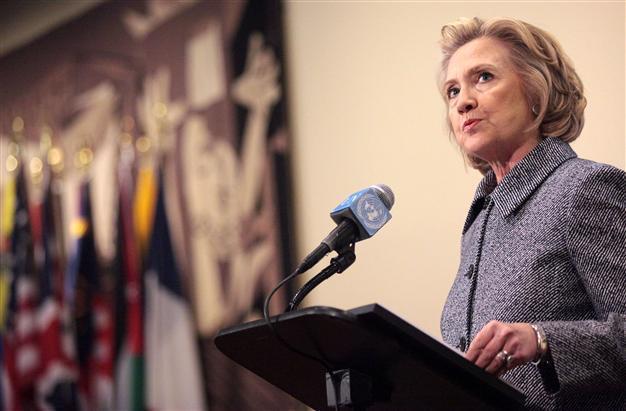Back in political fray, Clinton ends silence on email uproar
NEW YORK - Agence France-Presse

Clinton answered questions about recent allegations of an improperly used email account during her tenure as Secretary of State. AFP Photo.
Presumed 2016 presidential hopeful Hillary Clinton stormed back onto America's political stage on March 10, seeking to quell concerns she used private email while secretary of state but acknowledging it was not the "smarter" option.
In her first public comments since the controversy erupted last week, Clinton said she exclusively used a personal email account as a "matter of convenience," and insisted that the private server she used suffered no security breaches.
She also said "no classified material" was divulged in the emails, while promising she had turned over all work communications to the State Department.
But of the 63,320 emails Clinton sent and received during her four years as top diplomat, she defiantly said about 30,000 of them were personal, private records -- such as those planning her daughter's wedding and "yoga routines" -- and had been deleted.
And in a move not calculated to silence her critics, she said the Clinton family server on which all her emails were stored would not be turned over to the government or an independent commission.
Clinton, mindful of how several Republican lawmakers have questioned her actions, said she had taken "unprecedented" steps to comply with the law requiring official records be kept.
"Looking back, it might have been smarter" to use two separate phones and email accounts, Clinton told reporters after speaking at a United Nations women's conference.
"I thought one device would be simpler, and obviously it hasn't worked out that way."
Some 21 months after she left office, following a State Department request to her and previous secretaries of state, Clinton turned over some 55,000 pages of emails.
"We went through a thorough process to identify all of my work-related emails and deliver them to the State Department," she said.
But she offered no avenue for proving that potentially embarrassing work-related emails were not permanently deleted.
Asked directly if she or her team destroyed any work emails, she was unequivocal: "We did not."
The former first lady and US senator has been accused, mainly by her Republican opponents, of trying to improperly keep her emails out of the public domain.
While Clinton apparently contravened State Department guidelines against conducting official business on personal email, she insisted her actions were legal.
The 20-minute appearance, her first before a swarm of reporters since the email revelations last week, was an effort for the famous Democrat to tamp down the uproar before she possibly launches a run for the White House, as early as April.
But the press conference was less a study in seamless preparation for an all-but-certain campaign rollout and more a form of crisis management before two dozen television cameras.
Republicans kept up the pressure, demanding the entirety of Clinton's correspondence be reviewed for release.
"Secretary Clinton didn't hand over her emails out of the goodness of her heart -- she was forced to by smart, determined and effective oversight by the House Select Committee on Benghazi," House Speaker John Boehner's spokesman said, referring to the panel investigating the terror attacks in Libya in 2012 that killed four Americans.
Smelling fresh blood, committee chairman Trey Gowdy warned that Clinton's comments provided more questions than answers.
"Without access to Secretary Clinton's personal server, there is no way for the State Department to know it has acquired all documents that should be made public," Gowdy said.
"I see no choice but for Secretary Clinton to turn her server over to a neutral, detached third-party arbiter who can determine which documents should be public and which should remain private."
Gowdy also said he would urge Clinton to appear twice before his committee, first to "clear up her role and resolve issues surrounding her exclusive use of personal email," and then in a public hearing on Benghazi.
Clinton, who has laid low for months, had come under mounting pressure to address the emails, which Republicans have seized on as a sign Clinton may have sought to keep sensitive emails private despite her official communications being part of the public record.
The email publication process will take months, but the State Department said it would soon release an initial batch of 300.
Potential Republican presidential rival Jeb Bush recently released 250,000 emails from his time as Florida governor.
The Democratic National Committee noted that Bush too used a private account on a private server.
